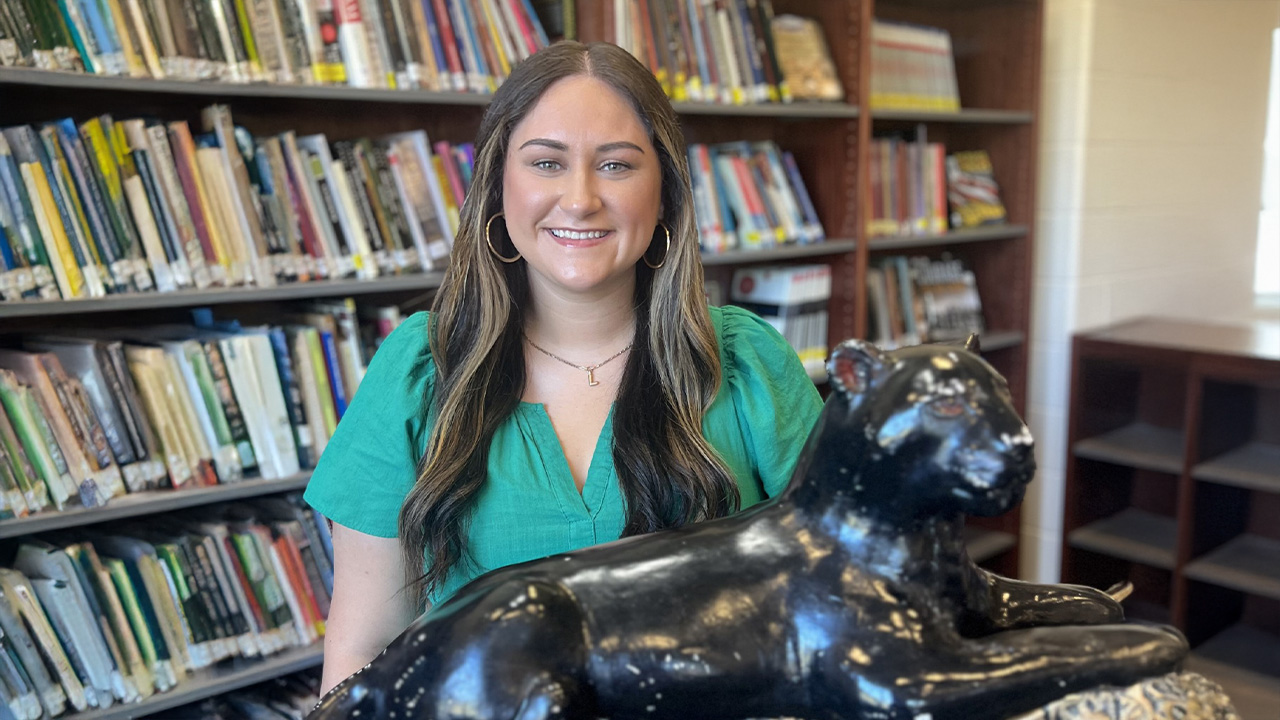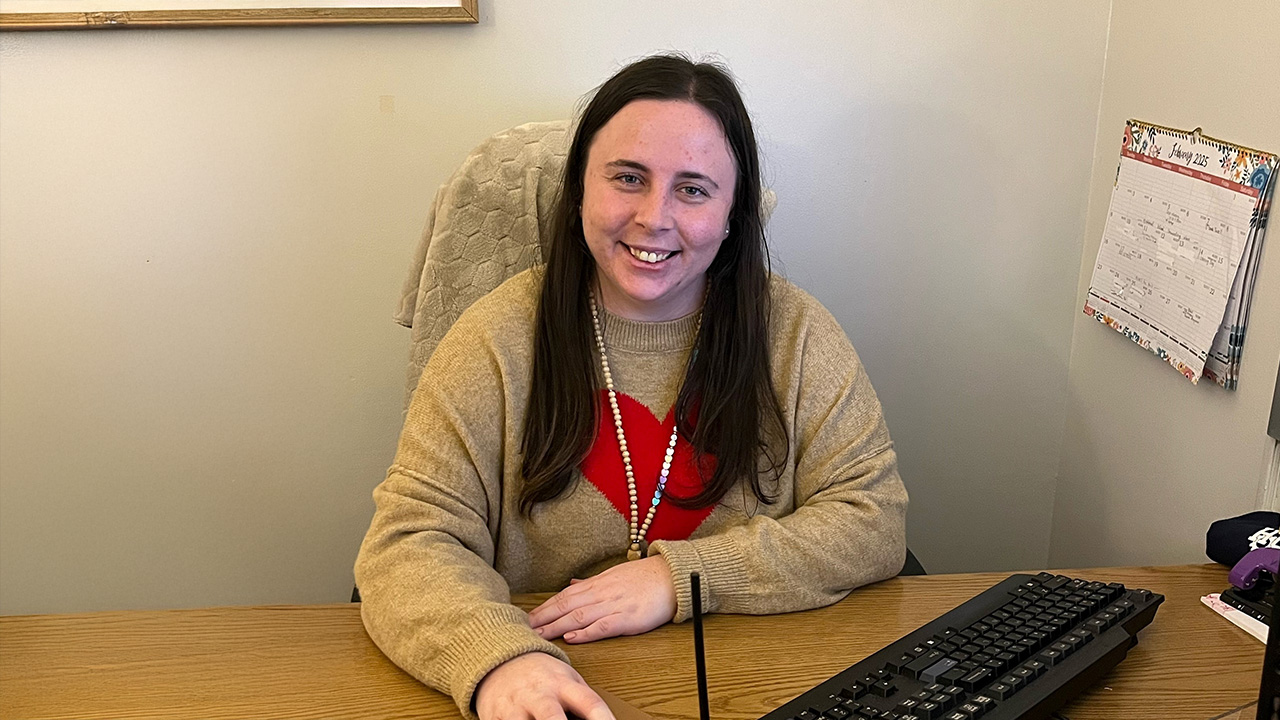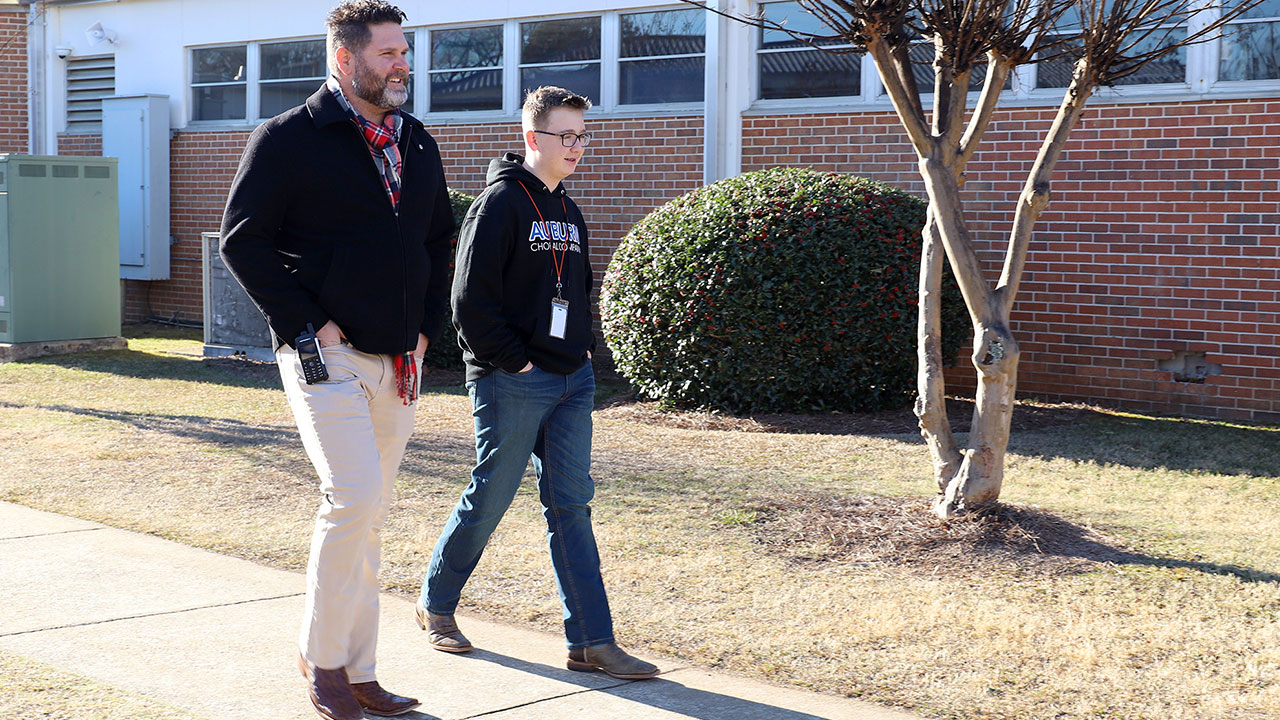content body
When a school counselor sees a child with tears, a headache or an upset stomach, Auburn University faculty member Malti Tuttle knows asking a few questions may reveal there’s more going on than meets the eye.
“Could there be something happening at school or in the home or with their mental health? Could it be psychosomatic symptoms related to bullying, peer conflict, anxiety or trauma? School counselors can collaborate with nurses to find specific resources: maybe the school social worker, an agency in the community or even access to health care,” said Tuttle, who teaches in Auburn’s College of Education.

Lesleigh Anderson is a 10th grade school counselor at Smiths Station High School in rural Lee County, Alabama.
She and her colleagues, including Jamie Harrison and Chih-hsuan Wang of the College of Education and the College of Nursing’s Morgan Yordy, are in their third year of administering the School Counseling Integrated Program (SCIP), which focuses on increasing mental health services in rural Alabama schools. Funded by a nearly $3 million grant from the U.S. Department of Education, SCIP aims to meet this goal by preparing school counseling graduate students to collaborate with school nurses and English for Speakers of Other Languages (ESOL) teachers.
While Yordy teaches students about the role of the school nurse, Harrison introduces them to the ESOL teacher perspective, lecturing on language acquisition, showcasing the legalities of ESOL student support and engaging the students in a language immersion experience.
“The aim of the grant is to increase mental health services in rural Alabama schools and to demonstrate interdisciplinary and cross-disciplinary collaboration,” Tuttle said. “By preparing our students to be able to understand the landscape and the needs of rural areas, the goal is for them to provide school counseling services to students facing the specific challenges of unique communities.”
An interdisciplinary education
Tuttle knows from her 13 years as a school counselor that students struggling with mental health often show up in the school nurse’s office first.
“I recall a student crying in the nurse’s clinic who was experiencing grief over a family member passing away,” she said. “I collaborated with the school nurse and worked with the student as they adapted and processed their grief.”
Her experiences working with school nurses inspired her to begin researching the topic with Yordy. In 2018, they developed the School Counselor and School Nurse Collaboration Model with colleagues and published it in the “Journal of School Counseling;” they have been teaching that model to their own students ever since.
In addition to school nurses, Tuttle worked closely with ESOL teachers during her time as a school counselor. Harrison and Tuttle have conducted research examining strategies to implement interdisciplinary collaboration to better support students and families as they adjust to a new language, culture, school and community.
“My principal believes in the importance of a school counselor, and hearing I was in a program that so well prepared me for the role was part of the reason I was placed on our school’s leadership team. He adjusted some of my responsibilities and awarded me with ‘Support Staff of the Month’ in September.”
SCIP Fellows
All Auburn students studying for a Master of Education in School Counseling receive this interdisciplinary education, but those students awarded SCIP fellowships receive extra support in the way of tuition assistance, membership in professional organizations like the American School Counselor Association (ASCA) and funding to travel to state and national conferences.
Eight SCIP Fellows graduated in 2024, and another five are expected to graduate this year. The support of the program means the graduates have easy access to professional experiences and fewer barriers when it comes to the cost of attending conferences.
“I had never been to an academic conference before the SCIP grant was implemented, and I absolutely loved every second of it,” said alumna O’Neil Roberson. “I found the breakout sessions to not only be intriguing but also super beneficial. Now that I have started my career, I have already been able to put my knowledge to use from these amazing conferences.”
Her classmate, Lesleigh Anderson, a 10th grade school counselor at Smiths Station High School in Alabama, agreed.
“The SCIP program gave me the amazing experience of being an ASCA member and traveling to conferences, which allowed me to make valuable connections,” she said. “Although I work at a large high school, most of our students are spread across rural areas of Lee County. Having connections while working in a rural area is imperative.”

Lauren Donnelly is a 9th grade school counselor at at Russell County High School in Seale, Alabama.
Putting knowledge to work
In their second year of the program, all of Auburn’s school counseling graduate students complete a practicum for 10 or more hours a week in the fall semester and then a full-time internship in the spring. Between their coursework and school experiences, they are highly qualified prospective employees. But when school administrators hear about the interdisciplinary nature of the SCIP program, Auburn grads are even more in demand.
“When I shared my experiences with school administrators, they were very impressed by the emphasis the SCIP program placed on real-world counseling experiences, as well as preparing counselors to be proactive and equipped to handle the wide array of challenges schools face,” alumna Zoe Kuykendall said. “This gave me credibility, and administrators appreciated that I had been well-prepared to work in a school setting that required flexibility, creativity and collaboration.”
Her classmate, Jessica Frum, a school counselor at Chisholm Elementary School in Montgomery, Alabama, agreed.
“My principal believes in the importance of a school counselor, and hearing I was in a program that prepared me so well for the role was part of the reason I was placed on our school’s leadership team,” Frum said. “He adjusted some of my responsibilities to align with ASCA and my school counseling curriculum and awarded me with ‘Support Staff of the Month’ in September.”
For her part, Tuttle is glad to hear her students say how well-prepared they are for their new roles and is excited the U.S. Department of Education recognizes Auburn’s work in doing so. Alumna Lauren Donnelly, a 9th grade school counselor at Russell County High School in Seale, Alabama, says the program’s preparation made the transition from student to professional an easy one.
“The SCIP program helped me connect with other professionals, get invaluable resources and travel to conferences,” Donnelly said. “My school administrators were thrilled to have someone with this knowledge on the staff. With these experiences I was able to advance my knowledge in the school counseling profession, and I knew I was ready to step into the role of a counselor this year.”





